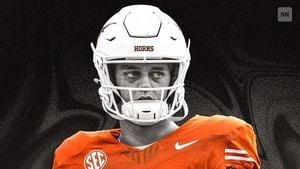The run-up to the 2026 Super Bowl has become a flashpoint in the ongoing American culture wars, as the National Football League’s decision to name Puerto Rican superstar Bad Bunny as its halftime headliner has ignited a fierce political and cultural backlash—especially among supporters of former President Donald Trump. The controversy comes on the heels of another musical uproar: country singer Zach Bryan’s anti-ICE lyrics, which have drawn ire from conservative circles and further exposed the nation’s deep ideological divides. With both artists standing at the crossroads of music, politics, and identity, the debate over who gets to represent America on its biggest stages has rarely felt more charged.
Bad Bunny, whose real name is Benito Antonio Martinez Ocasio, is no stranger to breaking records—or ruffling feathers. According to DW, his 2022 album Un Verano Sin Ti is Spotify’s most-streamed album of all time, and he held the title of most-played artist on the platform for three consecutive years. His September 2025 residency finale, Una Más, set a new Amazon Music record for the most-watched single-artist performance, capping off a series of 31 sold-out concerts in San Juan, Puerto Rico. The economic impact of those shows? Somewhere between $200 million and $700 million, a significant boost for the island during hurricane season.
Yet, for all his global success, Bad Bunny’s selection as the 2026 Super Bowl halftime performer has become a lightning rod for criticism from the American right. President Donald Trump, never one to shy away from cultural commentary, scoffed at the news on Newsmax’s Greg Kelly Reports: "I think it's absolutely ridiculous," he said, adding, "I've never heard of him." Trump’s reaction set the tone for a cascade of negative responses from MAGA-aligned figures, many of whom objected to Bad Bunny’s activism, his use of Spanish, and his perceived anti-Trump stance.
Conservative commentator Benny Johnson summarized the complaints on social media, labeling Bad Bunny a "Massive Trump hater," "Anti-ICE activist," and emphasizing, "No songs in English." Fox News host Tomi Lahren went so far as to claim, erroneously, that "He's not an American artist"—a statement quickly corrected by countless observers, as Puerto Ricans are, by birth, U.S. citizens. The episode highlighted not only the artist’s polarizing effect but also the persistent confusion about Puerto Rico’s status as a U.S. territory, where residents pay into Social Security and Medicare yet cannot vote in federal elections unless they reside on the mainland.
Homeland Security Secretary Kristi Noem added fuel to the fire, declaring that ICE agents would "be all over" the 2026 Super Bowl, and warning that the NFL would "not be able to sleep at night" after selecting Bad Bunny. The artist himself had previously cited fears of ICE raids as a reason for skipping U.S. mainland stops on his world tour. Meanwhile, far-right congresswoman Marjorie Taylor Greene responded by calling for English to be the official language of America, even though Trump had already signed an executive order to that effect in March. Greene also condemned what she termed "demonic sexual performances" during recent halftime shows.
Bad Bunny, for his part, has embraced the moment. Hosting the season premiere of Saturday Night Live on October 4, 2025, he joked about the backlash, quipping, "I think everybody is happy about it—even Fox News." He delivered part of his monologue in Spanish, celebrating Latino pride and telling viewers, "If you didn't understand what I just said, you have four months to learn!"—a playful nod to his upcoming all-Spanish halftime performance, which will be a Super Bowl first.
"What I'm feeling goes beyond myself," Bad Bunny said in a statement after the halftime show announcement. "It's for those who came before me and ran countless yards so I could come in and score a touchdown… this is for my people, my culture, and our history." As The New York Times noted, the political reverberations of his performance are likely to last long after the game’s final touchdown.
The storm over Bad Bunny’s Super Bowl debut comes as country music finds itself embroiled in its own political tempest. On October 7, 2025, Zach Bryan, a Grammy-winning country singer, released a snippet of an upcoming song featuring pointed anti-ICE lyrics: "And ICE is gonna come, bust down your door / Try to build a house no one builds no more / But I got a telephone / Kids are all scared and all alone." The clip, shared under the caption "the fading of red, white, and blue," quickly went viral—drawing praise from some for reviving "outlaw country" and condemnation from Trump supporters for its critical stance on law enforcement.
Tricia McLaughlin, assistant secretary at the Department of Homeland Security, was quick to jab at Bryan on social media, telling him to "Stick to Pink Skies," referencing one of his 2024 hits. Her department even posted a video montage set to Bryan’s song "Revival." The pushback was intense, but not entirely new for Bryan: in 2023, he publicly supported the transgender community and condemned fellow country artist Travis Tritt for removing Anheuser-Busch products from his tour after Bud Light’s collaboration with trans influencer Dylan Mulvaney.
Despite sharing a now-deleted photo with Trump at the Super Bowl earlier in 2025, Bryan has gone out of his way to clarify his political position. In an Instagram story posted on October 7, he wrote, "This song is about how much I love this country and everyone in it more than anything. When you hear the rest of the song, you will understand the full context that hits on both sides of the aisle." He continued, "I wasn’t speaking as a politician or some greater-than-thou asshole, just a 29 year old man who is just as confused as everyone else. To see how much shit it stirred up makes me not only embarrassed but kind of scared." Bryan insisted he is "on neither of these radical sides," urging fans to see the bigger picture: "The full song is about all of us coming out of this divided space."
For both artists, the backlash is deeply personal. Bryan admitted, "Over the past few months I had been scrutinized by more people than I ever thought possible. I feel like I’ve tried my hardest in so many ways and it’s so hard to see where my bearings even are anymore. Been falling off a cliff while trying to grow wings at the same time." Yet, he also expressed pride in living in a country where free speech and open conversation are still possible, saying, "I am proud to serve in a country where its people can all speak freely and converse amongst each other without getting doxxed or accosted on the internet or worse."
As debates over music, identity, and belonging play out on the national stage, the stories of Bad Bunny and Zach Bryan reveal just how fraught—and vital—these cultural crossroads have become. Whether in English or Spanish, country or reggaeton, the voices of artists continue to shape, and shake, the American conversation in unpredictable ways.




